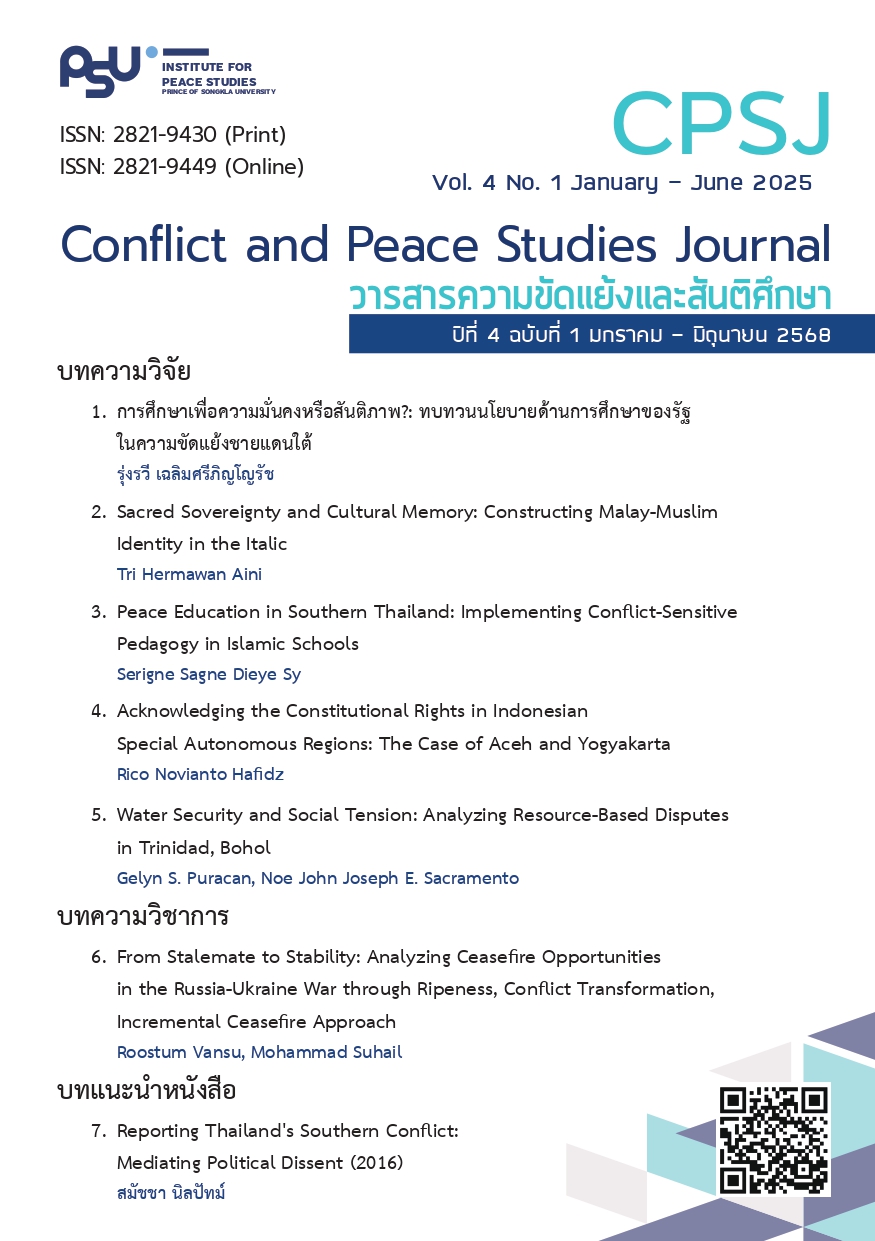Acknowledging the Constitutional Rights in Indonesian Special Autonomous Regions: The Case of Aceh and Yogyakarta
Main Article Content
Abstract
This article examines the central government's policy towards Aceh and Yogyakarta in relation to constitutional rights. Aceh and Yogyakarta become special autonomous regions after decades of conflict and longtime aspirations from citizens. The Indonesian constitutions grant the rights for citizens to govern autonomously based on aspiration and indigenous law. This research will use legal comparative research based on the national law, customary law, and general principles of constitutional rights. This research shows that autonomous region in Indonesia is implemented based on the aspirations of the people and in accordance with national law. However, recognition of customary law is not entirely fulfilled by the central government. This article promotes central government to recognize local democracy system in Indonesia for gain trust and peace in the relationship between central and local government.
Article Details
References
Arinanto, S. (2005). Hak Asasi Manusia dalam Transisi Politik di Indonesia. Jakarta: Pusat Studi Hukum Tata Negara Fakultas Hukum Universitas Indonesia.
Aspinall, E. (2007). From Islamism to Nationalism in Aceh, Indonesia. Journal of The Association for the Study of Ethinicty and Nationalism, 13(2), 245-263.
Aspinall, E. (2008). Peace without Justice? The Helsinki Peace Process in Aceh. Geneva: Centre for Humanitarian Dialogue.
Aspinall, E. (2018). Elite Bargains and Political Deals Project: Indonesia (Aceh) Case Study. Stabilitation Unit. UK Government Policy.
Asshiddiqie, J. (2011). Konstitusi dan Konstitusionalisme di Indonesia. Jakarta: Sinar Grafika.
Astriani, N., Nurlinda, I., Imami, A. A. D., Asdak, C. (2020). Pengelolaan Sumber Daya Air Berdasarkan Kearifan Tradisional: Perspektif
Hukum Lingkungan. Arena Hukum, 13(2), 197–217.
Blaug, R. & Schwarzmante, J. (2016). Democracy: A Reader. Columbia University Press.
Brancanti, D. & Snyder J. L. (2011). Rushing to the Polls: The Causes of the Premature Postconflict Elections. Journal of Conflict Resolution, 55(3), 469-492.
Cotula, L., Toulmin, C., & Quan, J. (2006). Securing Land Rights. In Better Land Access for the Rural Poor: Lessons from Experience and Challenges Ahead. International Institute for Environment and Development, 19–38.
Fahrimal, Y., & Safpuriyadi, S. (2018). Komunikasi Strategik Dalam Penyelesaian Konflik Agraria di Indonesia. Jurnal Riset Komunikasi, 1(1), 109-127.
Fong, B. (2017). In-between Liberal Authoritarianism and Electoral Authoritarianism: Hong Kong’s Democratization Under Chinese Sovereignty, 1997–2016. Democratization, 24(4), 724-750.
Hadiwijoyo, S. S. (2009). Menggugat Keistimewaan Jogjakarta: Tarik Ulur Kepentingan, Konflik Elit, Dan Isu Perpecahan. Pinus Book Publisher.
Harman, B. K. & Hendardi (Ed.), 1999. Konstitusionalisme Peran DPR dan Judicial Review. JARIM dan YLBHI.
Hill, C. & Menzel, J. (2008). Constitutionalism in Southeast Asia. Konrad Adenauer Stiftung.
Kuswanto. (2016). Politik Hukum Pengaturan Unsur Pimpinan Partai Politik. Jurnal Perspektif Hukum, 16(2), 188-201.
Listyaningrum, R. (2022). Upaya Penyelesaian Sengketa Hak Atas Tanah di Kawasan Wonorejo Kabupaten Blora. Jurnal Multidisiplin Indonesia, 1(3), 979–84.
Luhmann, N. (1965). Grundrechte als Institution: Ein Beitrag zur Politischen Soziologie. Duncker und Humblot.
MacIver, R.M. (1955). The Modern State (1st ed.). Oxford University Press.
Moejanto, G. (1994). Kasultanan Yogyakarta & Kadipaten Pakualaman: Tinjauan Historis Dua Praja Kejawen Antara 1755-1992. Penerbit Kanisius.
Movsesian, M. L. (1999). Sovereignty, Compliance and the World Trade Organization: Lessons from the History of Supreme Court Review. Michigan Journal of International Law, 20(4), 776-818.
Mueller, D. C. (1991). Constitutional Rights. Journal of Law, Economics, & Organization, 7(2), 313-333.
Novianto, R. (2024). Reflection of Special Autonomy by Aceh Local Government Policy in Economics and Politics Based on Helsinki MOU. CMU Journal of Law and Social Sciences, 17(1), 226-250.
Novianto, R. (2024). Regulatory Implementation in Aceh Special Autonomy Era by Local Government. Nitiparitat Journal, 4(2), 45-56.
Novianto, R. (2024). Special Autonomy as a One Conflict Solution for Aceh Peacebuilding. Conflict and Peace Studies Journal, 1(2), 141-169.
Pigeaud, T. G. T. & Graaf, H. J. (1976). Islamic States in Java, 1500–1700: Eight Dutch Books and Articles by H. J. de Graaf. The Hague: Nijhoff.
Ramadhan, A. 2023. Konflik Agraria Analisis Resolusi Konflik Agraria dan Sumber Daya Alam di Aceh. Jurnal Transformasi Administrasi, 13(1), 1–17.
Razali, M. F. (2017). Eksistensi Peran dan Kewenangan Lembaga Wali Nanggroe. Universitas Islam Negeri Ar-Raniry.
Sidiq, M. A. (2021). Special Autonomy of Yogyakarta in the Context of Local Autonomy Law. Law Research Review Quarterly, 7(4), 515-524.
Soehino. (2010). Hukum Tata Negara: Perkembangan Sistem Demokrasi di Indonesia / oleh Prof. H. Soehino. BPFE Fakultas Ekonomika dan Bisnis UGM.
Somek, A. (2008). Individualism: An Essay on the Authority of the European Union. Oxford University Press.
Sujamto. (1988). Daerah Istimewa Dalam Negara Kesatuan Republik Indonesia. Jakarta Bina Aksara
Sugiarto, S. & Barthos, M. (2024, May 25). The Politics of Land Law in Yogyakarta Special Region. the 4th International Conference on Law, Social Sciences, Economics, and Education, Jakarta, Indonesia.
ter Haar, B. (1948). Adat Law in Indonesia. New York, Institute of Pacific Relations.
Thornhill, C. (2016). A Sociology of Transnational Constitutions: Social Foundations of the Post-National Legal Structure. Cambridge University Press.
Williams, T. E. (1946). Our Constitutional Rights. The Phi Delta Kappan, 27(6), 168–168.

